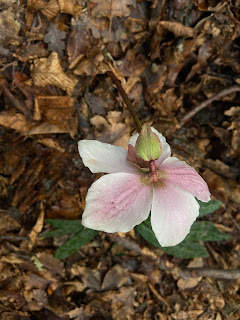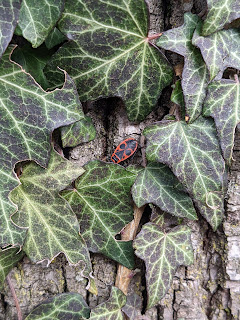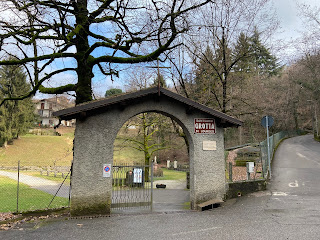Overview | Notes | Flora and Fauna | More Photos



Top left: Chiesetta di San Marco alla Maresana.
Top right: View east from Via alla Zarda across lower Maresana.
Bottom left: The entrance to Grotta di Rosciano.
Bottom center: A statue in the grotto.
Bottom right: The hike tracks.
Overview
Length: ~ 13.5 km
Duration: ~ 5 hours (includes lunch)
Elevation: 533 m elevation gain max
Location: Italy, Lombardy, Bergamo - Ponteranica
Notes
We had two objectives in mind for today's hike: finding a different way up to Maresana and stopping by the La Grotta di Rosciano, also called Santuario Grotta di Lourdes.
Maresana is the hill just north of Bergamo this is easily reacheable on foot from anywhere in Bergamo. Or, with a little help from the #6 bus to take you to the base of the hill. The max elevation in Maresana (Hill) is a respectable 546 m (1,791 feet). Not far from Maresana and completely connected by hiking trails is Canto Alto (Mountain) at 1,146 m (3,759 feet). The exact cutoff between hill and mountain is debatable, but Maresana feels like a hill and Canto Alto a mountain.
We've covered trips to Maresana numerous times, including:
- January 2020 – A Hike to Maresana for Lunch
- November 2020 – Two Hikes in the Hills of Parco dei Colli di Bergamo (passing through Maresana)
- August 2020 – Roundtrip Bergamo to Selvino (passing through Maresana)
- July 2020 – A Classic Bergamo Hike: Canto Alto (passing through Maresana)
- March 2020 – A Sunday Walk to Maresana
- May 2017 – A Short Hike from Bergamo to Monte di Nese (passing through Maresana)
- March 2017 – Walk from Bergamo to Maresana for Lunch
- June 2017 – A Hike from Maresana to Selvino
- December 2016 – A Walk from Bergamo to Ponteranica (passing through Maresana)
- December 2015 – Bergamo to Canto Alto (passing through Maresana)
The question you might be formulating is why don't we just move to Maresana? And, note the number of hikes in 2020 with Maresana as goal or waypoint. It's indicative of zero travel and a more intense focus on local attractions during the pandemic. Tourism kilometer zero.
We started today's hike by entering in Porta San'Agostino of Città Alta and exiting out Porta Garibaldi (technically named Porta San Lorenzo), and following Val Verde to a point we could cross SS470.
At this point we are in the neighborhoods of Valtesse and Valbona. Open City Maps shows "paths" up the hill, but as we found out, some went over private property or really weren't paths at all. In the end, we walked up part of the way on Via Maresana. We felt a little defeated. (Close inspection of the attached hike tracks shows a point were we back tracked on Via Richetti – rare for Travelmarx!)
From Via Maresana we walked a short stretch on Via Rosciano to find the grotto. Our spirits lifted immediately upon entering the La Grotta di Rosciano complex. The sanctuary/church is located in Rosciano, a frazione or hamlet of Ponteranica – just north of Bergamo across the valley. Rosciano is more or less the western part of Maresana.
The sanctuary has relatively recent origins. A parish priest named Luigi Ravasio was visiting the Sanctuary of Our Lady of Lourdes in France in 1925 and came up with the idea of recreating a smaller version of the famous pilgrimage sight in his own parish in Bergamo. According to an old brochure explaining the history of the grotto, the village was in need of a good source of drinking water as well. After many studies, consultation of dowsers (rabdomante in Italian) and tests, a source was found and the grotto was dedicated on September 13, 1930.
In English, we say grotto, while in Italian, it's grotta, feminine.
On our visit to the grotto today, we were the only ones. Perhaps on a gray day with light rain, no one is interested in a going inside a grotto? The church and source of water is excavated from a hillside with a road running over it. At maximum depth, the church penetrates about 75 feet into the hillside, really more of a chasm with light from above.
From the small garden in front of the grotto there is a pleasant view northwest toward Monte Linzone.
As a final word about La Grotta di Rosciano also labeled prominently as Santuario Grotta di Lourdes, it seems our parish priest Ravasio wasn't the only one moved to create a replica of Lourdes. The Wikipedia Lourdes grotto page lists a number of replicas around the world.
After the grotto, we hoofed it up Via Rosciano and then veered off into the woods on a trail to La Maresana (trattoria) for a nice, relaxed lunch. And to return back to Bergamo we followed trails down to end up on Via Col di Lana and Via all Zarda.



Lunch at Maresana, antipasto, primo (onion soup and crepes), and secondo (polenta with eggs and mushrooms).
Flora and Fauna
For flora, there were the usual mid winter suspects: the welcome splash of purple from common hepatica Anemone hepatica and a few gangly Christmas roses Helleborous niger, both in the buttercup (Ranunculaceae) family.



Left: Anemone. Center and right: Helleborous.
An unusual discovery was Pyrrhocoris apteris – commonly called the "firebug" near the Chiesetta di San Marco alla Maresana. To be honest, we went to rip ivy off the tree and noticed these insects.
In Italian, this insect is called la cimice rosso nera for it's resemblance to another insect, cimice. Cimice can mean bug (insect and hidden microphone) as well as specifically refer to Palomena prasina – the European shield bug or green stink bug, which is often just referred to as cimice. The emit a pungent odor when squished.




Photos of firebug under ivy leaves.
More Photos



Center: Garden outside the grotto.
Right: Informational sign in the grotto.


Right: A roadside altar on the way to Maresana.



Left: One of the many trails up to Maresana.
Center and right: Hike statistics.




No comments:
Post a Comment
All comments go through a moderation process. Even though it may not look like the comment was accepted, it probably was. Check back in a day if you asked a question. Thanks!